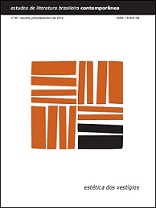Cidade de Deus:
entre o testemunho e a ficção
DOI:
https://doi.org/10.1590/S2316-40182012000200009Abstract
O presente artigo discute a problemática em torno da separação epistemológica entre o romance Cidade de Deus e seu autor, Paulo Lins, bem como as conotações referentes a possíveis leituras da obra no tangente ao seu “valor-verdade”. O estudo busca ainda analisar a recepção do texto de Lins no que convencionalmente veio chamar-se, dentro do contexto latino-americano, de testimonio. A análise da obra de Lins sob a rubrica testemunhal nos permitirá meditar sobre problemáticas questões relacionadas a qualquer texto fictício cujo conteúdo se faz demasiadamente próximo a eventos reconhecidamente fatuais, o que leva a obra literária e seus possíveis rótulos a uma crise ontológica cuja repercussão problematiza a literatura como um veículo de denúncia social e o autor como o mediador de tal processo.
References
BARROS, Sandro R. (2006). “Lifewriting with a vengeance: truth, subalternity and autobiographical determination in Reinaldo Arenas’s Antes que anochezca”. Caribe, v. 9, n. 1, p. 41-56.
________ (2010). Competing truths in Latin America: narrating otherness and marginality. Mountain View: Floricanto Press.
BARTHES, Roland (1972). Mythologies. Trad. Anette Lavers. New York: Hill and Wang.
________ (1977). “The death of the author”. In: Image, music, text. Trad. Stephen Heath. Glasgow: Fontana.
BAUDRILLARD, Jean (2004). Simulacra and simulation. Trad. Sheila Faria Glaser. Ann Arbor: University of Michigan Press.
BELENGUER, Mercè Picornell (2002). “Gestores de la voz ajena: el intelectual como mediador en la escritura testimonial”. Brujula, v. 1, n. 1, p. 37-52.
BEVERLEY, John (1999). Subalternity and representation. Durham: Duke University Press.
________ (2004). Testimonio: on the politics of truth. Minneapolis: University of Minessota Press.
CORONIL, Fernando (2000). “Listening to the subaltern: postcolonial studies and the neocolonial poetics of subaltern studies”. In: CHRISMAN, Laura; PERRY, Benita (Eds.). Postcolonial theory and criticism. Woodbridge: D. S. Brewer.
DERRIDA, Jacques (1997). Of grammatology. Trad. G. C. Spivak. Baltimore: Johns Hopkins University Press.
D’SOUZA, Dinesh (1991). Illiberal education: the olitics of race and sex on campus. New York: The Free Press.
GUSSOW, Mel (2004). “From Brazilian slums to Hollywood: a second wind for a director’s gritty slice of life”. The New York Times, New York, seção E, p. 1, 19 fev.
JOCENIR (2001). Diário de um detento. São Paulo: Laborletra.
LEJEUNE, Philippe (1989). On autobiography. Trad. Katherine Leary. Minneapolis: University of Minnesota Press.
LINS, Paulo (2002 [1997]). Cidade de Deus. São Paulo: Companhia das Letras.
LOUREIRO, Angel (2001). The ethics of autobiography: replacing the subject in modern Spain. Nashville: Vanderbilt University Press.
MENCHU, Rigoberta (1984). Me llamo Rigoberta Menchú y así se me nació la conciencia. Ed. Elizabeth Burgos Debray. Habana: Casa de las Américas.
PINO, Julio César (1997). Family and the favela: the reproduction of poverty in Rio de Janeiro. Wesport: Greenwood.
RIBEIRO, Paulo Jorge (2003). “Cidade de Deus na zona do contato: alguns impasses da crítica cultural contemporánea”. Revista de crítica literaria latinoamericana, n. 57, p. 125-139.
SKLODOWSKA, Elzbieta (1993). “Testimonio mediatizado: ¿ventriloquía o heteroglosia?” Revista de crítica literaria latinoamericana, n. 38, p. 81-90.
SPIVAK, Gayatri Chakravorty (1995). “Can the subaltern speak?” In: ASCHCROFT, Bill (Ed.). The postcolonial studies reader. New York: Routledge.
________ (1998). “Three women’s texts and circumfession”. In: HORNUNG, Alfred; HUSTER, Ernspeter (Eds.). Postcolonialism and autobiography. Atalanta: Rodopi.
VARELLA, Dráuzio (1999). Estação Carandiru. São Paulo: Companhia das Letras.
ZENI, Bruno (2002). Sobrevivente André du Rap (do Massacre do Carandiru). São Paulo: Labortexto.
Downloads
Published
Issue
Section
License
Authors who publish in this journal agree to the following terms:
a) The authors maintain the copyright and grant the journal the right of first publication, the work being simultaneously licensed under the Creative Commons Attribution License-Non Commercial 4.0 which allows the sharing of the work with acknowledgment of the authorship of the work and publication this journal.
b) Authors are authorized to enter into additional contracts separately, for non-exclusive distribution of the version of the work published in this journal (eg publish in institutional repository or as a book chapter), with authorship recognition and publication in this journal.
c) Authors are allowed and encouraged to publish and distribute their work online (eg in institutional repositories or on their personal page) after the editorial process, as this can generate productive changes, as well as increase the impact and citation of published work (See The Effect of Free Access).
d) The authors of the approved works authorize the magazine to, after publication, transfer its content for reproduction in content crawlers, virtual libraries and the like.
e) The authors assume that the texts submitted to the publication are of their original creation, being fully responsible for their content in the event of possible opposition by third parties.


